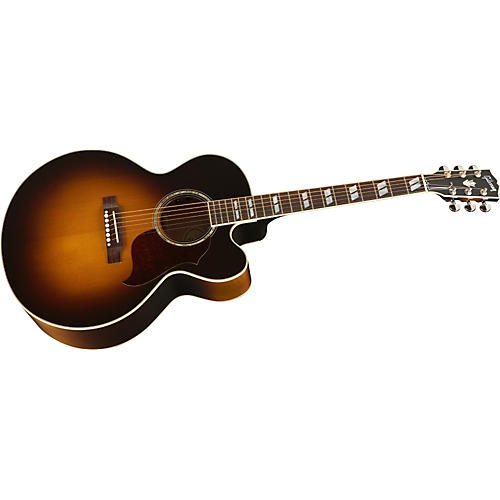Why Shop With Us?
Free Shipping
Free Standard Ground shipping (48 contiguous states, some overweight and Used/Vintage items excluded).
Orders placed before 3 p.m. ET usually ship the same business day.
Learn More2-Year Free Warranty on Guitars
Every guitar or bass you purchase from Musician's Friend (electric or acoustic, New or Open Box) includes two years of protection from manufacturer defects.
Contact Us for DetailsWe're Here for You
Our Gear Advisers are available to guide you through your entire shopping experience. Call or Chat for expert advice and to hear the latest deals.
Contact UsContact Us
Hablamos Español
866.226.2919
Hours:
MON - FRI 6 AM – 7 PM PT
SAT 6 AM – 6 PM PT
SUN 8 AM – 5 PM PT

J-185 EC Acoustic-Electric Guitar
false falseWe're sorry-this item is unavailable.
Contact our experts for a recommendation of great alternatives. Call us at 800-449-9128.
Powerful strumming, delicate fingerpicking, and everything in between.
Nickel Grover Rotomatic Tuners
Grover's original Rotomatic tuners are an engineering marvel, with style and performance exactly suited for the J-185 EC. With a gear ratio of 14:1, the Rotomatics deliver precision tuning in a durable housing that provides maximum protection for the gear and string post. All moving parts are cut for exact meshing, eliminating the possibility of slippage. A countersunk tension screw lets players regulate the tuning tension to any degree. A special lubricant inside the gear box provides smooth and accurate tuning stability.
Crown Peghead Logo
Gibson put the first crown peghead logo on an ES-300 back in 1940, and it has graced the headstocks of many legendary Gibson guitars ever since, including today's J-185 EC. Over the years, it has also been called a "thistle" because of the group of flowering plants with the sharp prickles, though Gibson has preferred to call it a "crown."
Pickguard
The tortoise pickguard for the J-185 EC is Gibson's standard 1950s-style Jumbo shape. As with all of Gibson Acoustic's pickguards, the coloring, inlay, and binding are all crafted by hand.
Abalone Rosette
A rosette is the beautiful, hand-crafted circle around the soundhole, and can be one of the most ornamental elements of any acoustic guitar. It is also one of the most subtle and complicated woodworking decorations on any acoustic guitar. The rosette on the J-185 EC is a double-ring rosette with an abalone-filled middle. The main ring consists of seven-ply binding, and the second ring is three-ply binding, adding a stylish, understated elegance to the J-185 EC.
Rosewood Fingerboard with Rolled Edges and Split Parallelogram Inlays
The fingerboard of Gibson's J-185 EC is constructed from the highest grade rosewood on earth, which is personally inspected and qualified by Gibson's team of skilled experts before it enters the Gibson factories. The resilience of this durable wood makes the fingerboard extremely balanced and stable, and gives each chord and note unparalleled clarity and bite. The J-185 EC's split parallelogram inlays are made of genuine mother of pearl, and are inserted into the fingerboard using a process that eliminates gaps and doesn't require the use of fillers. The fingerboard also sports a rolled edge”instead of the usual right angle where the fingerboard surface meets the neck, Gibson Acoustic's rolled edges are slightly beveled for an extremely smooth and comfortable feel, enhancing the playability of the J-185 EC.
Body Tonewoods (back, sides and top)
The top of the J-185 EC is made from AA-grade Sitka spruce, while the back and sides are constructed from AA-grade Eastern curly maple, giving the J-185 EC a warm, huge low end with ringing, harmonically rich treble response, capable of achieving a pure dynamic contrast, which makes it the perfect acoustic for just about any musical genre. Selecting the right wood, and the formula to dry it out, are two of the most central procedures to Gibson's guitar-building process. Beginning with its first catalog in 1903, Gibson has assured its customers that every guitar would be built using woods with "the most durable, elastic, and sonorous qualities," and today's guitars from Gibson Acoustic are no different.
Fishman Aura Pro Acoustic Pickup System
Gibson's J-185 EC comes equipped with a built-in Fishman Aura Pro, featuring Fishman's popular Aura Acoustic Imaging Technology. This ground-breaking pickup system reproduces the natural sound of the J-185 EC as miked in a professional studio, and onstage, thus eliminating the complicated setups of expensive microphones. Auro Pro uses digital algorithms to create images of various microphones' captured sounds. Players can then blend these images with an acoustic guitar's pickup to produce an immediate and dramatic improvement in amplified sound. The Fishman Aura Pro's preamp includes a tuner, and is mounted on the bass side rim of the upper bout.
Bracing
Every acoustic guitar made by Gibson features hand-scalloped, radiused top bracing inside the body, a feature normally found only in limited-run, hand-made guitars. By scalloping each brace by hand, the natural sound of the acoustic is focused more toward the center of the body, enhancing the instrument's sound projection. The bracing pattern inside the J-185 EC was created in 1951 as a smaller version of the design used in the Gibson's legendary Super Jumbos. This traditional "X" pattern delivers an exceptionally balanced tonal palette ideal for both the stage and studio environments, making the J-185 EC a standard choice among today's discerning players.
Gibson Logo
The Gibson name has graced the most innovative and revolutionary acoustic guitars of our time”the Super Jumbos, the J-45, the Hummingbird, the Dove. There is no mistaking the classic mother-of-pearl logo pressed onto the face of the headstock. It represents more than a century of originality and excellence. There is simply no equal.
Tapered Dovetail Neck Joint
The dovetail neck joint is one of the oldest”and best”ways of securely joining the neck to the body of a guitar. It is also a complex and expensive neck joint to build, but the result is a tight, locking connection that supports the neck at the proper neck-pitch angle, allowing the body and neck to become one solid piece of resonating wood, with no metal to impede vibration. This process is done entirely by hand, requiring patience and skill.
Radius Top
The top of many "flat-top" guitars are under a lot of stress from the pull of the strings, which can eventually compromise the top. So, while most acoustic guitars are true "flat-top" guitars, each of the acoustics produced by Gibson in Bozeman, Montana has a radiused, or "tuned," top. Instead of being perfectly flat, a radiused, or "tuned," top is raised slightly, and a special instrument is used to shape the top braces to the radius of the top. This process adds tension and strengthens the top, creating a less stressful joint where the top meets the sides and reduces the stresses of string pull. It also results in a "speaker cone" effect that maximizes sound projection, adding a significant boost to mid-range levels for a more balanced acoustic tone.
Nitrocellulose Finish
Applying a nitrocellulose finish to any Gibson acoustic guitar”including the J-185 True Vintage”is one of the most labor-intensive elements of the guitar-making process. Unlike the polyurethane finishes used by many guitar manufacturers, a nitrocellulose lacquer finish is porous when cured, allowing the wood to naturally "breathe" and mature. Microscopically thin, many finish colors require up to seven evenly applied layers to complete, each of which is inspected, leveled, and wet polished between coats for a glass-like finish. The time-consuming nature of a nitro finish has been employed ever since the first Gibson guitar was swathed with lacquer back in 1894. Why? For starters, a nitro finish means there is less interference with the natural vibration of the instrument, allowing for a purer tone. It's also a softer finish, making it easily repairable. You can touch up a scratch or ding on a nitro finish, but you can't do the same on a poly finish.
Body Binding
In general, a guitar's binding serves as a cosmetic feature, adding a subtle elegance to any Gibson acoustic while hiding the joints between the top, back, and sides, and helping to protect the guitar's body from any nicks or dings. But to see the process of putting the binding on a Gibson acoustic is to really appreciate the effort and attention put into each instrument. After the body has been glued together, the excess from the top and back are trimmed off and a groove is cut for the binding. The binding is then glued on and held on to the body using tape, and hung to dry. When the tape comes off, any excess glue is removed and the body is moved into the next phase of production. It has been done the same way for over 100 years, and is a fundamental part of Gibson Acoustic's rich guitar-making history.
Check the drop-down menu to the right to select colors and/or other options.
Features
- Nickel Grover Rotomatic Tuners
- Crown Peghead Logo
- Abalone rosette
- Rosewood Fingerboard with Rolled Edges and Split Parallelogram Inlays
- Fishman Aura Pro Acoustic Pickup System
- Gibson Logo
- Tapered Dovetail Neck Joint
- Radius Top
- Nitrocellulose Finish
J-185 EC Acoustic-Electric Guitar Specifications:
- Type: Steel-string Jumbo acoustic-electric guitar
- Top material: Solid Sitka spruce
- Back wood: Solid flamed maple
- Side wood: Solid flamed maple
- Finish: Lacquer
- Neck wood: Maple
- Fretboard: Rosewood
- Scale length: 24-3/4"
- Nut width: 1.725"
- Neck joint: Set-in
- Number of frets to body: 20
- Pickup : yes
- With case: Hardshell
- Number of strings: 6
- Free Standard Ground shipping (48 contiguous states, some overweight and Used/Vintage items excluded).
- Orders placed before 3 p.m. ET usually ship the same business day.
Every guitar or bass you purchase from Musician's Friend (electric or acoustic, New or Open Box) includes two years of protection from manufacturer defects.
Our Gear Advisers are available to guide you through your entire shopping experience. Call or Chat for expert advice and to hear the latest deals.

Musician's Friend Support





































































































































